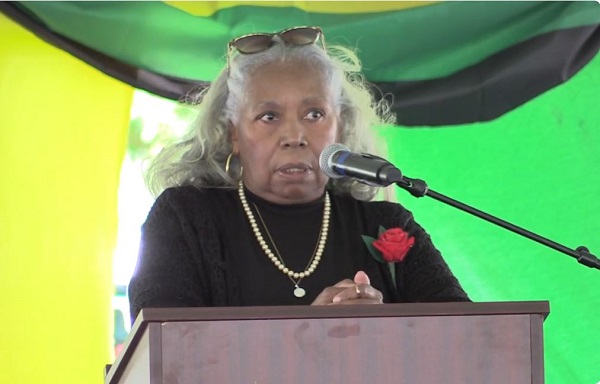Commemoration honors Eugene’s pioneering Black community
7 min read
The Black Cultural Initiative hosted a celebration Sept. 15 honoring the pioneering Black families in Eugene. KEPW’s Todd Boyle was there. Here is an excerpt from the remarks by Brenda Thompson.
Brenda Thompson (Washington family): Pearlie and Leo Washington moved here in 1941. They were given a letter of employment which allowed them to legally move to California because they would be in the employment of a white family. That family was very kind, respectful, and helpful to Pearlie and Leo which allowed them to remain in Eugene in spite of being the first to settle and remain with their family.
[00:00:48] Pearlie, to be the first Black woman walking alone down the streets of Eugene, and tolerating the glares, the stares, the hollers, the comments, the ugliness that she and Leo dealt with. They were stronger than I am. Because when I turned 21, I could not bear the trauma any longer. And I left.
[00:01:20] I certainly returned because they were here. My family was here. My roots were here. And I would visit here with regularity. But each time I visited, it reminded me why I left in the first place: the verbal abuse, the racist behavior, just all of what happened in Eugene was too much for me…
[00:01:47] One was the cross burning.
[00:01:49] It was an evening, late. Our phone rang. It rang again, rang again. Pearlie and Leo were bustling around. I’d never seen him go in the closet and get his rifle. But he went into the closet, he got his rifle, he loaded it, he put extra bullets in his pocket, and he and Pearlie brought us together and said they had to leave and they wanted to make certain all windows and doors were locked because we didn’t do that.
[00:02:27] Eugene was not a place where you locked up everything. So they said, ‘Don’t answer the phone, don’t answer the door, go to your rooms and stay there until we get back.’ So, of course, we were terrified. We’d never seen them act like that. We had no idea what was going on.
[00:02:47] After a while they returned and they told us that a cross had been burned by the Klan in the house next door to the Mims.
[00:02:57] A woman with—single woman, mother with five kids lived in that house alone and they just were not going to leave her without protection. And the men, the African-descended men of Eugene that were as close as they could get to her, all rushed to that house to protect that mother and her children. That was the house that my mother, grandmother, brothers and I had lived in prior to becoming children of Pearlie and Leo.
[00:03:29] It was traumatizing. It is something I don’t think I’ll ever forget.
[00:03:35] John Q: But let’s start at the beginning, with the ‘Across the Bridge’ community. Speaking about Pearlie and Leo Washington, Brenda Thompson.
[00:03:43] Brenda Thompson: So. They were the founding family here, African American family. And they opened their home and their lives to the others who followed. Because they knew that without the help of each other, these families would not have been able to remain in Eugene. And as it was, they were all pushed to the outskirts of Eugene. They lived without any services. They had no running water. They had no toilet facilities. The rains would come and the village would flood. But they received no assistance. It was a horrible time. But they remained.
[00:04:35] Then they were relocated. They were forced to get out of this village. And they left this village with no place to go. Families were relocated out to West 11th, where again they faced homes that they had to create for themselves, no electricity, no running water, no bathroom facilities.
[00:05:02] So, they went from one very, very difficult area to another difficult area.
[00:05:09] Pearlie and Leo, because of their service with this other family, were able to purchase their own home—on the outskirts, we were right on the edge of the city limits, and another Black community was formed. And that was East 2nd Street, from High Street to Mill Street, from Mill to 3rd, and from 3rd back up to High, and with one or two families living toward the bridge on 3rd Street.
[00:05:44] It was a very nice community. There were people helping each other. Pearlie and Leo were avid fishermen. If it didn’t rain, they fished, and even on days when it sprinkled, they fished. And they would keep the fish, and it was in the freezer, and then on a nice, bright, sunny Friday afternoon, they had a community fish fry.
[00:06:11] They would invite the community to potluck, bring a dish because they were going to provide all the fish and trust me, I cleaned a number of fish so I can tell you there was a lot. And that’s how we would gather culturally and share and support one another.
[00:06:31] But in 1964—and this is not well known—we lost everything through eminent domain. That entire block area, we were all displaced yet one more time. Why? They said there was no other land in Eugene.
[00:06:52] I’m only here for a couple of days, driving around, I’ve seen lots of empty land, to this day. So back in ‘64, I can assure you, there was plenty of open land in, throughout the Eugene area. But no, they had to have that particular land. So again, the Black community was shredded.
[00:07:15] It was held together pretty much by the St. Mark’s CME (Christian Methodist Episcopal) Church, which Pearlie and Leo started in their home. Fortunately, they were there long enough for St. Mark’s to be built. And so when our property was taken and we were all separated again, we still had the church.
[00:07:37] Mr. and Mrs. Mims had a front house and they would then allow the house to be used for community gatherings. So that still gave us that sense of togetherness, that sense of culture for us. Fortunately, their home was not on the side of the street where the razing took place for the rest of us.
[00:07:59] So, Pearlie and Leo, they struggled, but they remained firm in their conviction that Eugene was home. It was better than where they had come from, and they were determined to make it better for us, their generation of children. So they again had to move out to North Eugene and everybody else scattered.
[00:08:25] It was very difficult because no longer could you just run next door. No longer could you just go hang out with your friends. We were everywhere at that point. But we pulled it together and we still persevered.
[00:08:44] John Q: Brenda honored her late elder brother, Gerry Thompson.
[00:08:48] Brenda Thompson: After the funeral, I’m sitting in my brother’s—Gerry’s—hallway in the dark because I’m overwhelmed, because there were so many people at the funeral that they were standing room only in the chapel, standing room only in the hallway. They were lined up outside, and it was pouring down raining.
[00:09:09] Get to the house, they come to the house, there’s more food than we could ever do anything with. I’m sitting in there, and I’m just cross-legged on the floor, And I look up, and there is this little human…and she comes toddling down, she climbs into my lap, she puts her arms around me, she hugs me, she pats me on the back, and she won’t let go.
[00:09:35] Her mother came and finally found her, tried to take her. She would not go. I told the mother, ‘Leave her alone.’ She said, ‘She’s bothering you.’ I said, ‘No, she’s not. She’s my angel. She’s been sent to me.’ She had never seen me before, and she’s never seen me since. But she sat in my lap and she hugged me and she patted me. So I say, Eugene, you’ve come a long way. You’ve come a long way.
[00:10:07] I thank you, all of you, for your presence here. I want to thank the BCI (Black Cultural Initiative) for having the tenacity to stay with this project as it had become very difficult for us. But they roll through it as if it is smooth as glass. And so I want to thank them and honor them for their work.
[00:10:33] And then I want to thank the city of Eugene, the county of Lane, and the state of Oregon for acknowledging the wrong that was done and doing everything you can to make certain that this never happens again. They say history repeats itself. Please, Eugene, do not repeat the history that I as a child had to live through to the point where I had to leave.
[00:11:02] John Q: That’s Brenda Thompson speaking Sept. 15 at the Black Cultural Initiative’s commemoration and celebration of Eugene’s Black community. This excerpt is just part of the complete video of the event, recorded by Todd Boyle and available on YouTube.





